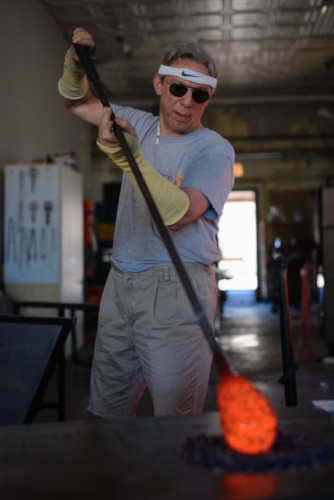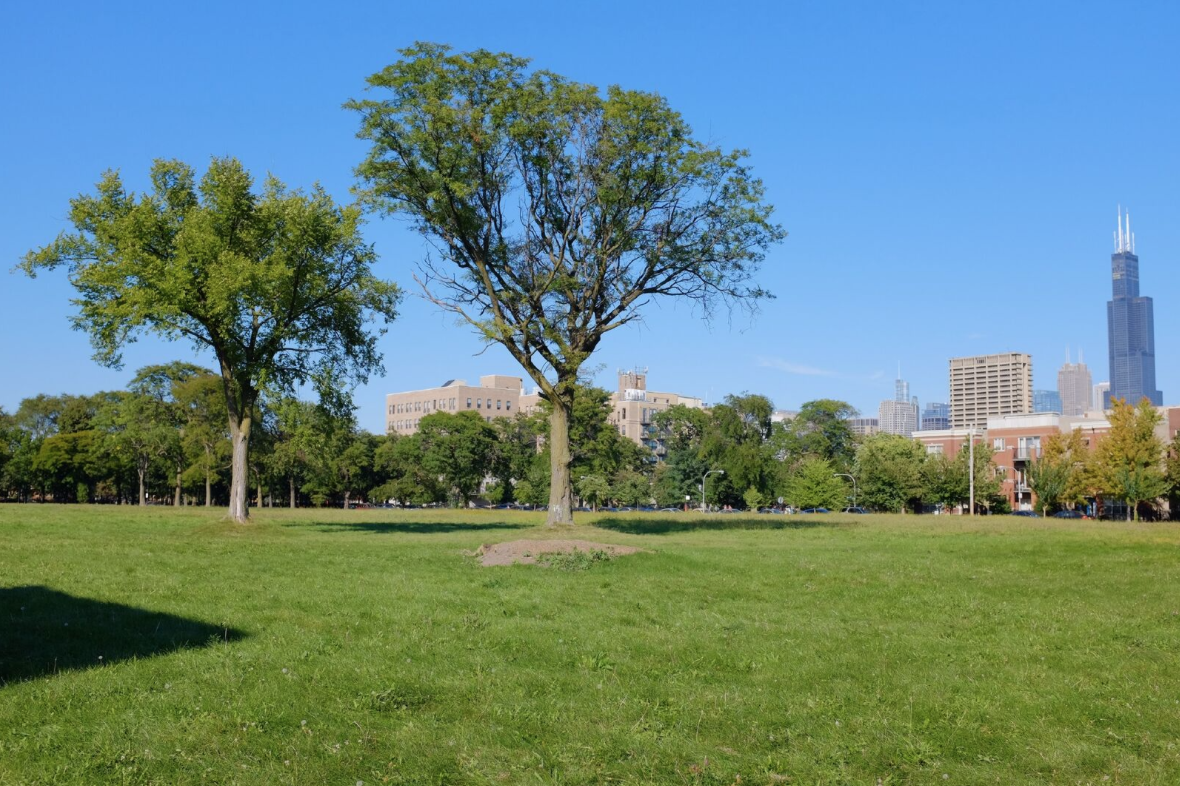Best Perpetual Cause for Optimism
Little Italy’s Empty Lots
Arriving at the intersection of Taylor and Racine, you’re greeted by vast expanses of uneven grass containing neither commerce nor signage. Shops clustered west and east of these lots receive consistent foot traffic, while the unlucky shops facing the vacancies are left to sit and ponder. Shop owners such as Monica Rodriguez, of the sweet shop Skinny Piggy, describe the confusing and frustrating nature of past gossip regarding these empty spaces. Rodriguez relocated her business to Little Italy five years ago, with the knowledge that the lots had been empty for one year already. Placing trust in landlords who describe potential developments, shop owners renew their leases, reinvesting in their businesses on promises that surrounding areas will improve. But while various projects are rumored to be under way, none ever break ground. On the suggestion that a park may appear, for instance, hope renews, but it’s quickly dashed: when asked, the Chicago Park District says that a park hasn’t been planned or discussed recently, because there’s an overabundance of parks elsewhere in the ward. Neighborhood natives, as well as tourists who arrive from far-reaching destinations (perhaps expecting “Little Italy” to display Italian heritage and history ) suggest that the empty lots house more Italian restaurants, a museum, or even a relocated National Italian American Sports Hall of Fame. Elsewhere in the city, steps have been taken to accept community input and plan the development of vacant lots: on June 23 of this year, the 25th Ward held a community meeting in Pilsen to discuss the future use of “Open Space.” A similar meeting may be of use to Little Italy, which is also part of the 25th Ward. (Neal Jochmann)
Best Fire in a Firehouse
Firehouse Art Studio

When the firefighters from Engine Company 18 moved their headquarters from Roosevelt Road to Blue Island Avenue in 2008, they left behind the oldest active firehouse in Chicago. Built in 1873 across the street from Holy Family Church (est. 1857, and also still standing), the building was auctioned off and reinvented in 2010—it now contains Firehouse Art Studio, a glassblowing and ceramics studio. The structure remains largely unchanged, and a proud mural at the back attests to the space’s firefighting origins (though its boast of “1873 and still pumping” now rings a bit hollow). However, the odd assortment of objects—there are clay bowls and glass sculptures, but also the torso and legs of a mannequin hanging from the ceiling, and ruby slippers on a shelf —mark it as a creative space. It also confuses passersby. “People just always come in wondering if we’re selling shit,” says Risa Recio, a self-described “all-around-Firehouse gal” who works there as artist in residence, studio manager, teacher, and technician.
Jay Nowak and Jessica Beauchemin bought the firehouse from the city on one condition: that they use it to serve the community. To that end, Firehouse regularly hosts free neighborhood programming, like a chili cook-off where contestants first come in and fashion their own bowls out of clay. Local kids often have the run of the place after they get out of school, and there’s a space at the back they can color and play with clay (which has the added benefit of keeping them away from the hot shop and its 1200-degree furnace). One of the studio’s most important programs is Project FIRE, a glassblowing workshop for young Chicagoans traumatized by gun violence. They use Firehouse to make and sell their art, and have met with a good deal of success: two participants were recently invited to a week-long residency at New York’s Corning Museum of Glass. “They’re a super special group to us,” said Recio. (Christian Belanger)
Firehouse Art Studio, 1123 W. Roosevelt Rd. Visit for community workshop hours.
Best Libations
The Coffee Alley
On an average weekday, The Coffee Alley is filled with casual conversations, leisurely afternoon meals, and UIC students hunched over laptops and homework—some munch on paninis, some sip lavender milk tea or La Colombe, and some slurp smoothies. It’s congenial, and that’s the point, according to owner Sara Roberts, who founded the shop with her husband Bill in 2012,. The brick walls and ample seating are meant to emulate the outdoor coffee shops of Europe: “We wanted to bring a gourmet European touch to Little Italy,” she said in an email. That’s fair: though Little Italy is many things, European is not one of them. But one or two Sundays each month, the scene is quite different: the shop is packed to the gills with the congregation of Oasis Church, a nondenominational church launched by a couple from the south suburbs in July of this year. Their mission is to “support, love, and share the greatest news of all time with every single person.” Roberts says the shop’s openness to the church (which does not have a permanent building of its own) is just one example of their hospitality to community groups in general—commercial filmings, book signings, and student organization meetings happen in the shop all the time, she says, and the owners don’t charge if they don’t have to close the shop for the event. (Jake Bittle)
The Coffee Alley, 1152 W. Taylor St. Monday–Friday, 7am–9pm; Saturday–Sunday, 8am–9pm. (312) 526-3873. thecoffeealley.com
Best Institution
Oscar D’Angelo
Descriptions of Oscar D’Angelo—the man dubbed the “Mayor of Little Italy,” who died on August 7—tend toward moral ambiguity: a friend told the Reader he has “a magnetic perspicacity”; 25th Ward Alderman Danny Solis once asked Daley the Younger, with frustration: “Who is this guy? Keyser Söze?” according to DNAinfo. D’Angelo’s own wife, called him a “consigliere” in a Sun-Times article about his death. (She also said he had “the biggest heart in the world.”) They’re fitting tributes to a man whose City Hall influence lasted about half a century, beginning with his aid to Daley the Elder during efforts to erect a permanent UIC campus at Harrison and Halsted. The controversial move was protested by furious residents and led to the displacement of eight thousand people; meanwhile, D’Angelo claimed his help was vital in preserving the neighborhood’s Italian community.
Over the decades, D’Angelo continued to wield his clout over Little Italy and the rest of the city; most recently, he successfully fought against the Lucas Museum as a Friends of the Park board member. He has also flirted with the edges of the law. In 1989, he was disbarred as an attorney for actions the Supreme Court of Illinois deemed outside the bounds of “ordinary social hospitality”—gifting car rentals to judges and elected officials, presumably in return for favors. A 2003 confrontation with the owner of Mario’s Italian Ice (“Best Ice” in last year’s edition of this issue) is more intriguing: Mario DiPaolo, the ice stand’s owner, was charged with battery after a physical altercation with D’Angelo, who had apparently been bothering DiPaolo because of his refusal to sell or develop land he owned on Taylor Street. Perhaps the pair buried the hatchet—or the Weekly has fallen victim to a piece of online mischief—because about four years ago, a user named Oscar D’Angelo posted an online review for Mario’s Italian Ice that simply read: “This place is the BEST! Thank you Mario; you are an institution on Taylor Street.” Of course, the last phrase applies just as well to D’Angelo himself. (Christian Belanger)


